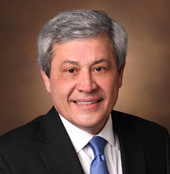A top Vanderbilt-Ingram Cancer Center (VICC) investigator recently met with Vice President Joe Biden regarding the National Cancer Moonshot Initiative, a major national program to identify, fund and accelerate the most promising research leading to cancer cures.
Carlos L. Arteaga, M.D., director of the Center for Cancer Targeted Therapies and the VICC Breast Cancer Program, was among 15 leading cancer experts who met privately with Biden prior to his address to attendees at the American Association for Cancer Research (AACR) Annual Meeting held recently in New Orleans. Arteaga is a past president of the AACR.

“It was quite inspirational, as well as a special honor, to be able to host the Vice President and the second lady, Dr. Jill Biden, and be able to hear of their commitment to accelerate cancer research and what it can deliver to patients,” said Arteaga, the Donna S. Hall Professor of Breast Cancer.
Biden told the audience that the Cancer Moonshot project is designed to streamline the design of clinical trials, develop methods to share data and to realign incentives in cancer research to serve patients with the goal “to end cancer as we know it.”
Approximately 19,500 participants from academic medical centers, health care facilities, the medical industry and patient groups attended this year’s international AACR conference. During the event, investigators from around the world unveiled the latest in cancer research.
This year, VICC investigators made nearly 50 presentations, headlining educational sessions, training workshops and presenting posters on their cancer research.
Stephen Fesik, Ph.D., Orrin H. Ingram II Professor of Cancer Research and co-leader of the Signal Transduction and Chemical Biology Research Program, presented updates on the success of new approaches to target the RAS family of proteins, including K-Ras, which is implicated in several forms of cancer but has been considered “undruggable.” Fesik’s laboratory is focused on cancer drug discovery, including identification of small molecules that bind to K-Ras.
Jeffrey Rathmell, Ph.D., co-leader of the Host-Tumor Interactions Research Program and director of the Vanderbilt Center for Immunobiology, described recent studies on the role of the tumor microenvironment on anti-tumor immunity and the role that metabolism may play in controlling the immune system.
David Cortez, Ph.D., Ingram Professor of Cancer Research and co-leader of the Genome Maintenance Research Program, discussed his laboratory’s latest findings on how to best target the DNA damage response signaling pathway using new drugs advancing through clinical trials.
During a methods workshop, Yu Shyr, Ph.D., Harold L. Moses Professor of Cancer Research and director of the Vanderbilt Center for Quantitative Sciences, presented the analytical challenges of integrating multiple “omics” information in the era of precision medicine.












